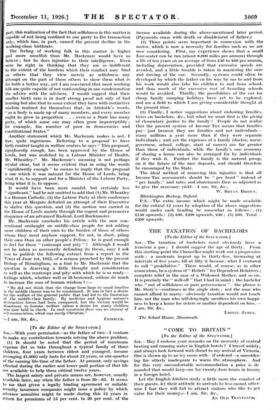[To the Editor of the SPECTATOR.] SIR, Withyour permission—as the
father of two—I venture to make my contribution towards solving the above problem.
(1) It should be noted that the period of maximum expense (let us take throughout a typical family of 'three children, four years between eldest and youngest, income averaging £1,000) only lasts for about 12 years, or one-quarter of the earning life-time of the father. At present, only savings effected during the earlier and lower paid portion of that life are available to help these critical twelve years.
The largest salary and private means are, however, usually
available later, say when the father is from 50-65. It seems to me that given a legally binding agreement or suitable security, insurance companies might issue a policy by which advance annuities might be made during this 12 years in return for premiums of 15 per cent. to 20 per cent. of the
income available during .the above-mentioned later period. (Payments cease with death or disablement of father.) (2) Three points seem important in connexion with the motor, which is now a necessity for families such as we are now considering. First, my experience shows that a small four-seater can be run (about 6,000 miles per annum) through a life of ten years on an average of from £40 to £60 per annum, including depreciation, provided that excessive speeds are avoided, and a little trouble is taken in mastering the care and driving of the car. Secondly, systems could often be developed by which the father on his way by car to and from his work would also take his children to and from school, and thus much of the excessive cost of boarding schools would be avoided. Thirdly, the possibilities of the car for cheap family camping holidays have yet to be explored, and are a field to which I am giving considerable thought at the present time.
(3) Finally, I notice suggestions about endowing families, -taxes on bachelors, &c., but what we want first is the giving of elementary justice to the family ! People do not realize that the present system of Income Tax means that families pay—just because they are families and not individuals-- many millions a year more than if they were separate individuals ; and yet the expenses of a family (doctor, nurse, governess, school, college, start of career) are far greater than those of individuals, while the family's one economy of sharing a house can also be arranged for by individuals -if they wish it. Further the family is the natural group, on it the future of the race depends, and should therefore be encouraged by the State.
The ideal method of removing this injustice is that all Income Tax assessments should be " per head " instead of " per family," and rates and abatements then so adjusted as to give the necessary yield.—I am, Sir, &c., Bletchington Rectory, Oxford. W. BRYAN BROWN.
P.S.—The extra income which might be made available for the critical 12 years by adoption of the above suggestions would under each heading be somewhat as follows :—(1) £150 upwards ; (2) £60, £200 upwards, /30 ; (3) £60. Total— £500 upwards.














































 Previous page
Previous page